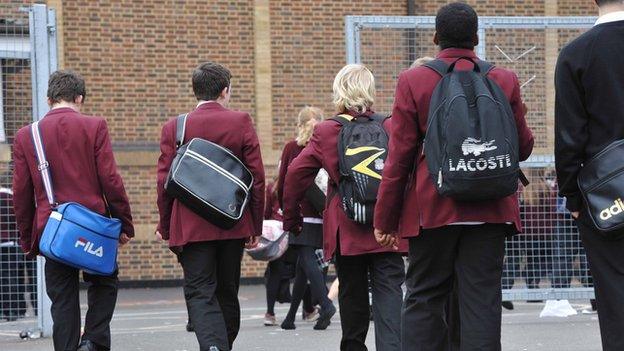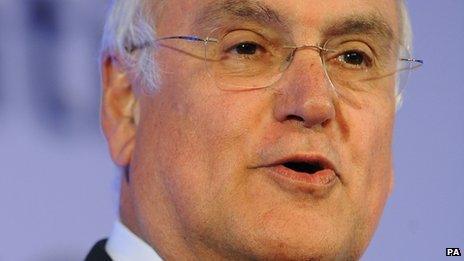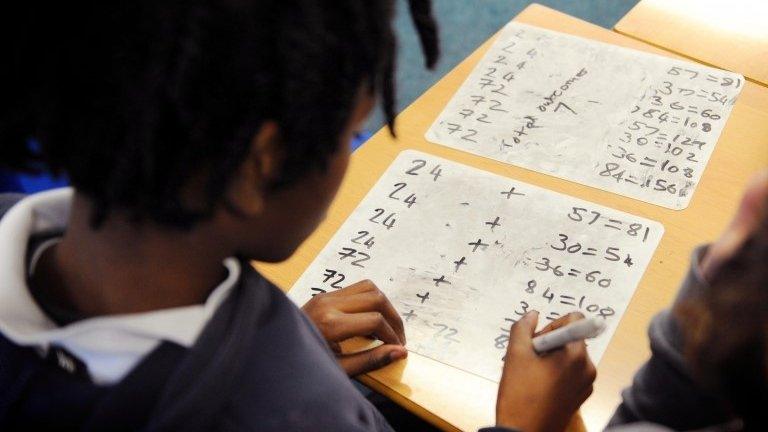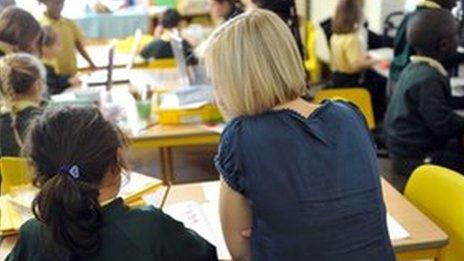Cameron challenged on 'no cuts' school funding promise
- Published
- comments
David Cameron: "The next step in our education revolution"
David Cameron has promised a future Conservative government would protect England's schools budget in cash terms, but per pupil funding would not keep pace with inflation.
The prime minister said the government would provide a further £7bn for extra places for rising numbers of pupils.
Mr Cameron said hundreds more secondary schools would become academies.
Labour's Tristram Hunt said Tory claims to protect funding were "unravelling" and represented a "real-terms cut".
On school funding, the prime minister promised to protect "flat cash" per pupil spending, but this would reduce in value with inflation.
Mr Cameron said this would mean "difficult decisions", but the government had demonstrated that with greater efficiency "more could be achieved with less".
Changing leadership
But Mr Hunt said: "The truth is that you can't protect schools when you have plans to take spending as a share of GDP back to levels not seen since the 1930s."
David Laws, the Liberal Democrat schools minister, said the financial commitment from David Cameron was "unbelievably weak".
He said it would mean a real-terms cut for schools and "deep cuts" in spending on pre-school and post-16 education.
Education Secretary Nicky Morgan: "Just enough is not good enough"
The director of the Institute for Fiscal Studies, Paul Johnson, said the proposal represented a "watering down" of a ring-fenced budget.
"There will just be a cash protection, so real-terms falls over the next Parliament," he said.
The Association of Colleges said restricting the budget protection to schools was "desperately disappointing" for further education and sixth form colleges.
Schools in England
Most recent Ofsted inspection (2006-14)
16,266
primary schools
3,150
secondary schools
-
81% primaries outstanding or good
-
18% primaries inadequate or requiring improvement
-
70% secondaries outstanding or good
-
29% secondaries inadequate or requiring improvement
On school standards, the prime minister said the government "won't tolerate failure" and would raise achievement in 3,500 schools rated "requires improvement" by Ofsted.
They would have new leaderships imposed - such as being taken over by academy trusts. Struggling academies would be switched to other academy sponsors.
Schools labelled as "requires improvement" are above the lowest "inadequate" rating, but below the levels of "good" and "outstanding".
Mr Cameron, speaking at Kingsmead school in north London, said that every secondary school in this "requires improvement" category would be expected to become an academy.
The BBC's Vicki Young gives her analysis of Monday's debate on school funding
Education Secretary Nicky Morgan earlier told the BBC: "This is not about saying heads would automatically be replaced.
"Where a school doesn't have the capacity to improve itself, and many do, or where they don't have a plan that is going to lead to that school being rated good or outstanding, then one of the answers might be to get new leadership in."
'Not good enough'
Almost a quarter of secondary schools, about 720 schools, are rated as requiring improvement. About 16% of primary, more than 2,600 schools, would be affected by the proposals.
"No-one wants their child to go to a failing school and no-one wants to them to go to a coasting school either," said Mr Cameron.
"'Just enough' is not good enough. That means no more sink schools and no more 'bog standard' schools either.
"Our aim is this: the best start in life for every child, wherever they're from - no excuses."

The education select committee reported there was no clear evidence academies raised standards
Russell Hobby, leader of the National Association of Head Teachers, attacked the proposals as "ill informed" and a decision to "declare war on schools".
"David Cameron has chosen to do what it is easy - score points off teachers and play with structures - rather than what is difficult but effective - work with the profession to improve the quality of teaching," said Mr Hobby.
But the CBI backed plans to improve "critical building blocks" such as English and maths.
"We can no longer tolerate a long tail of poor achievement that leaves many young people struggling and too many employers needing to help them catch up," said CBI director-general, John Cridland.
Mary Bousted, leader of the ATL teachers' union, criticised the plan as "self-serving, publicity-seeking nonsense".
Teachers' unions highlighted that last week the cross-party House of Commons education select committee found no clear evidence that academies had "raised standards overall".
In particular MPs said there was no evidence of improvement from primary academies and called on the government to commission research as a matter of urgency.
Changing control
Schools which are already academies and which fall into the "requires improvement" category face being taken away from their existing academy chain and run by another.
Shadow Education Secretary Tristram Hunt says the key to improving standards is "really high quality teaching in the classroom"
Ofsted's annual report shows more than a third of sponsored academies, both primary and secondary, are currently rated as requiring improvement, a higher proportion than local authority schools.
Free schools which are in this rating could also be handed over to another academy group.
Sixth form students at Southend High School for Boys explain how funding cuts have affected them
The areas more likely to be affected are those with the highest proportion of pupils not attending "good" or "outstanding" schools.
For primary schools this would be Medway, Doncaster, Bracknell Forest and East Sussex.
At secondary level, Ofsted's figures show it would be the Isle of Wight, Hartlepool, St Helens and Oldham.
The label "requires improvement" was introduced by Ofsted Sir Michael Wilshaw, replacing what had previously been the "satisfactory" category.
Times table tests
On Sunday, head teachers' leaders had reacted angrily to suggestions that primary schools could be failed or heads replaced if any pupils failed to pass a times table test.
Mrs Morgan announced plans for tougher primary maths tests, including that all pupils should know their 12 times table.

Sir Michael Wilshaw replaced the "satisfactory" grade with "requires improvement"
Ministers announced two years ago that primary pupils would have to learn the 12 times table by the age of nine and it became a requirement in the updated curriculum.
Mrs Morgan's target is for England's schools to catch up with international competitors and to enter the top five of the PISA tests in English and maths by 2020.
Labour's Tristram Hunt argued that the quality of teaching was the key to raising school standards to match international competitors.
"Many parents will be shocked to learn that David Cameron's government has changed the rules to allow unqualified teachers into the classroom on a permanent basis, leading to a 16% rise in the last year alone."
- Published2 February 2015

- Published1 February 2015

- Published27 January 2015

- Published17 January 2012
